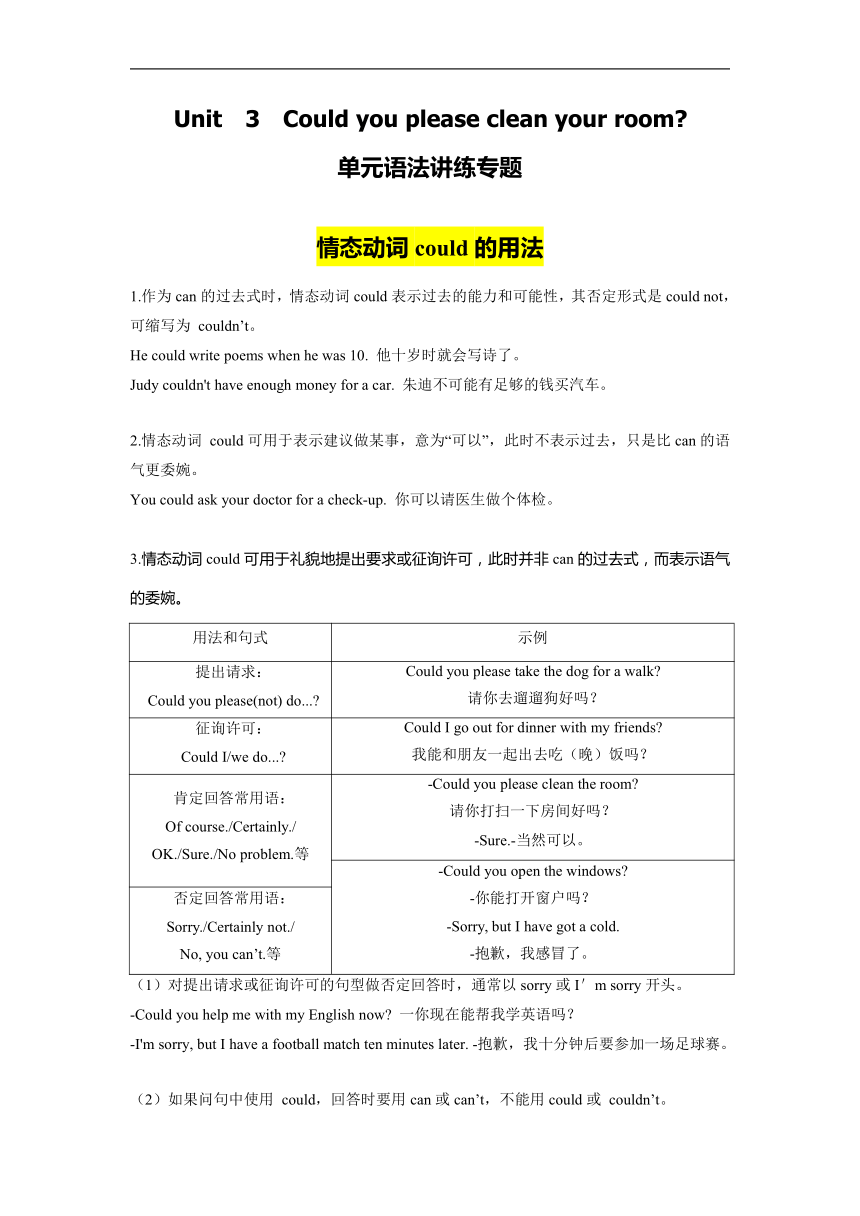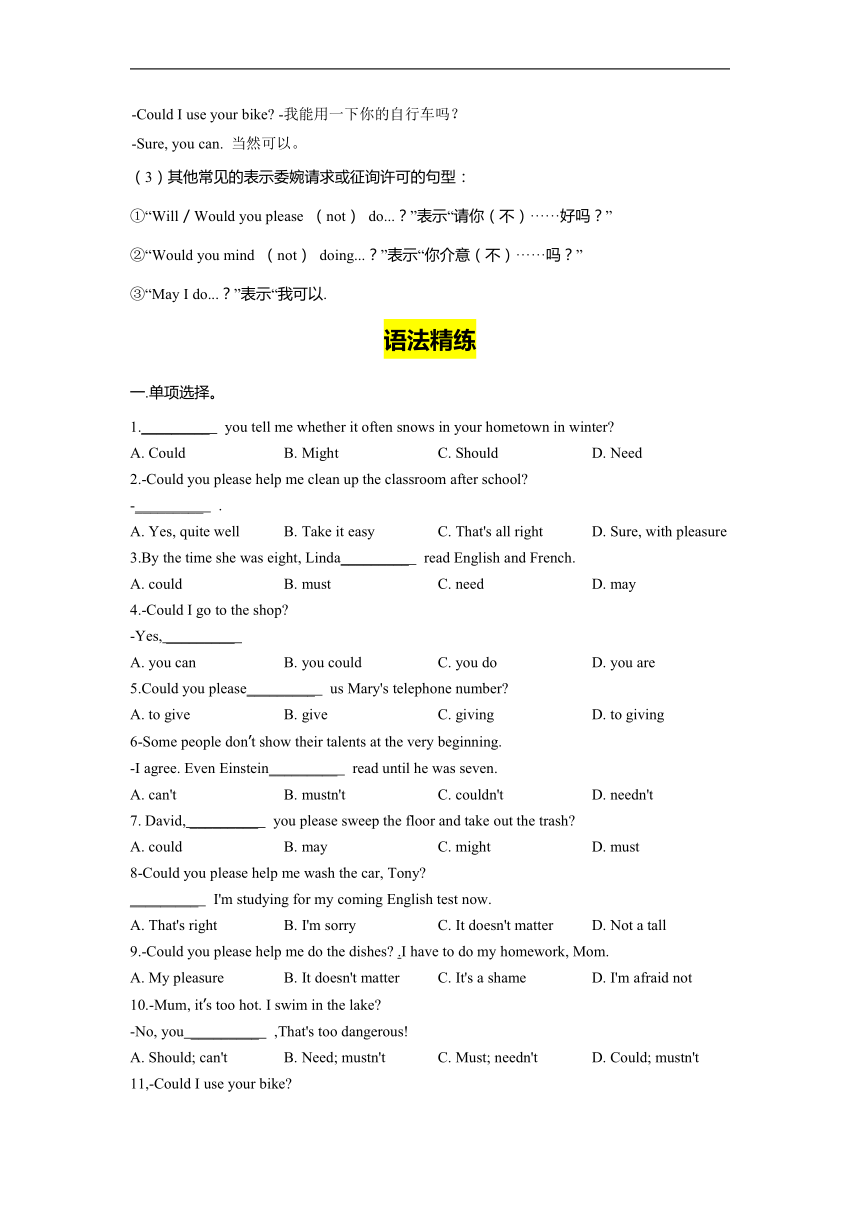Unit 3 Could you please clean your room?语法讲练专题-情态动词could的用法(含答案)
文档属性
| 名称 | Unit 3 Could you please clean your room?语法讲练专题-情态动词could的用法(含答案) |

|
|
| 格式 | docx | ||
| 文件大小 | 26.0KB | ||
| 资源类型 | 教案 | ||
| 版本资源 | 人教新目标(Go for it)版 | ||
| 科目 | 英语 | ||
| 更新时间 | 2022-02-24 00:00:00 | ||
图片预览


文档简介
Unit 3 Could you please clean your room
单元语法讲练专题
情态动词could的用法
1.作为can的过去式时,情态动词could表示过去的能力和可能性,其否定形式是could not,可缩写为 couldn’t。
He could write poems when he was 10. 他十岁时就会写诗了。
Judy couldn't have enough money for a car. 朱迪不可能有足够的钱买汽车。
2.情态动词 could可用于表示建议做某事,意为“可以”,此时不表示过去,只是比can的语气更委婉。
You could ask your doctor for a check-up. 你可以请医生做个体检。
3.情态动词could可用于礼貌地提出要求或征询许可,此时并非can的过去式,而表示语气的委婉。
用法和句式 示例
提出请求: Could you please(not) do... Could you please take the dog for a walk 请你去遛遛狗好吗?
征询许可: Could I/we do... Could I go out for dinner with my friends 我能和朋友一起出去吃(晚)饭吗?
肯定回答常用语: Of course./Certainly./ OK./Sure./No problem.等 -Could you please clean the room 请你打扫一下房间好吗? -Sure.-当然可以。
-Could you open the windows -你能打开窗户吗? -Sorry, but I have got a cold. -抱歉,我感冒了。
否定回答常用语: Sorry./Certainly not./ No, you can’t.等
(1)对提出请求或征询许可的句型做否定回答时,通常以sorry或I'm sorry开头。
-Could you help me with my English now 一你现在能帮我学英语吗?
-I'm sorry, but I have a football match ten minutes later. -抱歉,我十分钟后要参加一场足球赛。
(2)如果问句中使用 could,回答时要用can或can’t,不能用could或 couldn’t。
-Could I use your bike -我能用一下你的自行车吗?
-Sure, you can. 当然可以。
(3)其他常见的表示委婉请求或征询许可的句型:
①“Will/Would you please (not) do...?”表示“请你(不)······好吗?”
②“Would you mind (not) doing...?”表示“你介意(不)······吗?”
③“May I do...?”表示“我可以.
语法精练
一.单项选择。
1._________ you tell me whether it often snows in your hometown in winter
A. Could B. Might C. Should D. Need
2.-Could you please help me clean up the classroom after school
-_________ .
A. Yes, quite well B. Take it easy C. That's all right D. Sure, with pleasure
3.By the time she was eight, Linda_________ read English and French.
A. could B. must C. need D. may
4.-Could I go to the shop
-Yes, _________
A. you can B. you could C. you do D. you are
5.Could you please_________ us Mary's telephone number
A. to give B. give C. giving D. to giving
6-Some people don’t show their talents at the very beginning.
-I agree. Even Einstein_________ read until he was seven.
A. can't B. mustn't C. couldn't D. needn't
7. David, _________ you please sweep the floor and take out the trash
A. could B. may C. might D. must
8-Could you please help me wash the car, Tony
_________ I'm studying for my coming English test now.
A. That's right B. I'm sorry C. It doesn't matter D. Not a tall
9.-Could you please help me do the dishes .I have to do my homework, Mom.
A. My pleasure B. It doesn't matter C. It's a shame D. I'm afraid not
10.-Mum, it’s too hot. I swim in the lake
-No, you _________ ,That's too dangerous!
A. Should; can't B. Need; mustn't C. Must; needn't D. Could; mustn't
11,-Could I use your bike
-Yes, you_________ But you_________ keep it clean.
A. could; can B. can; must C. must; can D. could; must
12.Could you please speak a little louder I _________ hear you very well.
A. can't B. mustn't C. shouldn't D. needn't
13.-Jerry,would you like to tell me how to take a taxi through “Didi”
- _________ .
A. Take it easy B. You are welcome C. Thank you D. Sure, I'd love to
答案:
1.A 2.D 3.A 4.A 5.B 6.C 7.A 8.B 9.D 10.D 11.B 12.A 13.D
二·可型转换。
1.Could you please wash clothes at this time?(改为否定句)
Could you please_________ _________ clothes at this time
2.-Could you please answer these questions?(作肯定回答)
-_________ _________ .
3.-Could I húng out with 'my friends after the party?(作否定回答)
-No, _________ _________
4. “Can I play for a while after school ” she asked. (改为间接引语)
She asked_________ _________ _________ play for a while after school.
5.Would you mind passing me the doll?(改为同 义句)
_________ you please_________ me the doll
答案:
1.not wash 2.no problem 3.you can’t 4.if she could 5.Could; pass
三.根据汉语意思完成句子,每空一词。
1.能请你帮我扫地吗?
_________ _________ _________ _________ me sweep the floor
2.-爸爸,我今晚可以玩电脑游戏吗?
-是的,你可以。但你必须先完成你的家庭作业。
-_________ I_________ computer games tonight, Dad
-Yes, you_________ .But you have to finish your homework first.
3.-能请你帮我把门打开吗?
-好的,当然可以。
_________ you_________ _________ me open the door
-Yes, _________ .
4.-明天上午我们可以去爬山吗?
-对不起,你们不能。
-_________ we_________ to climb the mountain tomorrow morning
-Sorry, you_________ .
答案:
1.Could you please help
2.Could; play; can
3. Could; please help; sure
4.Could; go; can’t
单元语法讲练专题
情态动词could的用法
1.作为can的过去式时,情态动词could表示过去的能力和可能性,其否定形式是could not,可缩写为 couldn’t。
He could write poems when he was 10. 他十岁时就会写诗了。
Judy couldn't have enough money for a car. 朱迪不可能有足够的钱买汽车。
2.情态动词 could可用于表示建议做某事,意为“可以”,此时不表示过去,只是比can的语气更委婉。
You could ask your doctor for a check-up. 你可以请医生做个体检。
3.情态动词could可用于礼貌地提出要求或征询许可,此时并非can的过去式,而表示语气的委婉。
用法和句式 示例
提出请求: Could you please(not) do... Could you please take the dog for a walk 请你去遛遛狗好吗?
征询许可: Could I/we do... Could I go out for dinner with my friends 我能和朋友一起出去吃(晚)饭吗?
肯定回答常用语: Of course./Certainly./ OK./Sure./No problem.等 -Could you please clean the room 请你打扫一下房间好吗? -Sure.-当然可以。
-Could you open the windows -你能打开窗户吗? -Sorry, but I have got a cold. -抱歉,我感冒了。
否定回答常用语: Sorry./Certainly not./ No, you can’t.等
(1)对提出请求或征询许可的句型做否定回答时,通常以sorry或I'm sorry开头。
-Could you help me with my English now 一你现在能帮我学英语吗?
-I'm sorry, but I have a football match ten minutes later. -抱歉,我十分钟后要参加一场足球赛。
(2)如果问句中使用 could,回答时要用can或can’t,不能用could或 couldn’t。
-Could I use your bike -我能用一下你的自行车吗?
-Sure, you can. 当然可以。
(3)其他常见的表示委婉请求或征询许可的句型:
①“Will/Would you please (not) do...?”表示“请你(不)······好吗?”
②“Would you mind (not) doing...?”表示“你介意(不)······吗?”
③“May I do...?”表示“我可以.
语法精练
一.单项选择。
1._________ you tell me whether it often snows in your hometown in winter
A. Could B. Might C. Should D. Need
2.-Could you please help me clean up the classroom after school
-_________ .
A. Yes, quite well B. Take it easy C. That's all right D. Sure, with pleasure
3.By the time she was eight, Linda_________ read English and French.
A. could B. must C. need D. may
4.-Could I go to the shop
-Yes, _________
A. you can B. you could C. you do D. you are
5.Could you please_________ us Mary's telephone number
A. to give B. give C. giving D. to giving
6-Some people don’t show their talents at the very beginning.
-I agree. Even Einstein_________ read until he was seven.
A. can't B. mustn't C. couldn't D. needn't
7. David, _________ you please sweep the floor and take out the trash
A. could B. may C. might D. must
8-Could you please help me wash the car, Tony
_________ I'm studying for my coming English test now.
A. That's right B. I'm sorry C. It doesn't matter D. Not a tall
9.-Could you please help me do the dishes .I have to do my homework, Mom.
A. My pleasure B. It doesn't matter C. It's a shame D. I'm afraid not
10.-Mum, it’s too hot. I swim in the lake
-No, you _________ ,That's too dangerous!
A. Should; can't B. Need; mustn't C. Must; needn't D. Could; mustn't
11,-Could I use your bike
-Yes, you_________ But you_________ keep it clean.
A. could; can B. can; must C. must; can D. could; must
12.Could you please speak a little louder I _________ hear you very well.
A. can't B. mustn't C. shouldn't D. needn't
13.-Jerry,would you like to tell me how to take a taxi through “Didi”
- _________ .
A. Take it easy B. You are welcome C. Thank you D. Sure, I'd love to
答案:
1.A 2.D 3.A 4.A 5.B 6.C 7.A 8.B 9.D 10.D 11.B 12.A 13.D
二·可型转换。
1.Could you please wash clothes at this time?(改为否定句)
Could you please_________ _________ clothes at this time
2.-Could you please answer these questions?(作肯定回答)
-_________ _________ .
3.-Could I húng out with 'my friends after the party?(作否定回答)
-No, _________ _________
4. “Can I play for a while after school ” she asked. (改为间接引语)
She asked_________ _________ _________ play for a while after school.
5.Would you mind passing me the doll?(改为同 义句)
_________ you please_________ me the doll
答案:
1.not wash 2.no problem 3.you can’t 4.if she could 5.Could; pass
三.根据汉语意思完成句子,每空一词。
1.能请你帮我扫地吗?
_________ _________ _________ _________ me sweep the floor
2.-爸爸,我今晚可以玩电脑游戏吗?
-是的,你可以。但你必须先完成你的家庭作业。
-_________ I_________ computer games tonight, Dad
-Yes, you_________ .But you have to finish your homework first.
3.-能请你帮我把门打开吗?
-好的,当然可以。
_________ you_________ _________ me open the door
-Yes, _________ .
4.-明天上午我们可以去爬山吗?
-对不起,你们不能。
-_________ we_________ to climb the mountain tomorrow morning
-Sorry, you_________ .
答案:
1.Could you please help
2.Could; play; can
3. Could; please help; sure
4.Could; go; can’t
同课章节目录
- Unit 1 What's the matter?
- Section A
- Section B
- Unit 2 I'll help to clean up the city parks.
- Section A
- Section B
- Unit 3 Could you please clean your room?
- Section A
- Section B
- Unit 4 Why don't you talk to your parents?
- Section A
- Section B
- Unit 5 What were you doing when the rainstorm came
- Section A
- Section B
- Review of Units 1-5
- Unit 6 An old man tried to move the mountains.
- Section A
- Section B
- Unit 7 What's the highest mountain in the world?
- Section A
- Section B
- Unit 8 Have you read Treasure Island yet?
- Section A
- Section B
- Unit 9 Have you ever been to a museum?
- Section A
- Section B
- Unit 10 I've had this bike for three years.
- Section A
- Section B
